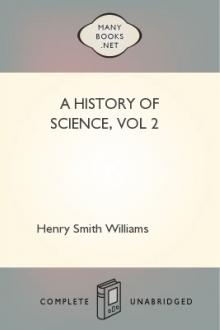A History of Science, vol 2 by Henry Smith Williams (great novels txt) 📖

- Author: Henry Smith Williams
- Performer: -
Book online «A History of Science, vol 2 by Henry Smith Williams (great novels txt) 📖». Author Henry Smith Williams
APPENDIX
REFERENCE LIST
[1] (p. 4). James Harvey Robinson, An Introduction to the History of Western Europe, New York, 1898, p. 330.
[2] (p. 6). Henry Smith Williams, A Prefatory Characterization of The History of Italy, in vol. IX. of The Historians’ History of the World, 25 vols., London and New York, 1904.
[1] (p. 47). Etigene Muntz, Leonardo do Vinci, Artist, Thinker, and Man of Science, 2 vols., New York, 1892. Vol. II., p. 73.
THE NEW COSMOLOGY—COPERNICUS TO KEPLER AND GALILEO
[1] (p. 62). Copernicus, uber die Kreisbewegungen der Welfkorper, trans. from Dannemann’s Geschichle du Naturwissenschaften, 2
vols., Leipzig, 1896.
[2] (p. 90). Galileo, Dialogo dei due Massimi Systemi del Mondo, trans. from Dannemann, op. cit.
GALILEO AND THE NEW PHYSICS [1] (p. 101). Rothmann, History of Astronomy (in the Library of Useful Knowledge), London, 1834.
[2] (p. 102). William Whewell, History of the Inductive Sciences, 3 Vols, London, 1847-Vol. II., p. 48.
[3] (p. 111). The Lives of Eminent Persons, by Biot, Jardine, Bethune, etc., London, 1833.
[4] (p. 113). William Gilbert, De Magnete, translated by P.
Fleury Motteley, London, 1893. In the biographical memoir, p.
xvi.
[5] (p. 114). Gilbert, op. cit., p. x1vii.
[6] (p. 114). Gilbert, op. cit., p. 24.
[1] (p. 125). Exodus xxxii, 20.
[2] (p. 126). Charles Mackay, Popular Delusions, 3 vols., London, 1850. Vol. II., p. 280.
[3] (p. 140). Mackay, op. cit., Vol. 11., p. 289.
[4] (P. 145). John B. Schmalz, Astrology Vindicated, New York, 1898.
[5] (p. 146). William Lilly, The Starry Messenger, London, 1645, p. 63.
[6] (p. 149). Lilly, op. cit., p. 70.
[7] (p. 152). George Wharton, An Astrological jugement upon His Majesty’s Present March begun from Oxford, May 7, 1645, pp. 7-10.
[8] (p. 154). C. W. Roback, The Mysteries of Astrology, Boston, 1854, p. 29.
[1] (p. 159). A. E. Waite, The Hermetic and Alchemical Writings of Paracelsus, 2 vols., London, 1894. Vol. I., p. 21.
[2] (p. 167). E. T. Withington, Medical History from the Earliest Times, London, 1894, p. 278.
[3] (p. 173). John Dalton, Doctrines of the Circulation, Philadelphia, 1884, p. 179.
[4] (p. 174). William Harvey, De Motu Cordis et Sanguinis, London, 1803, chap. X.
[5] (p. 178). The Works of William Harvey, translated by Robert Willis, London, 1847, p. 56.
MEDICINE IN THE SIXTEENTH AND SEVENTEENTH CENTURIES
[1] (p. 189). Hermann Baas, History of Medicine, translated by H.
E. Henderson, New York, 1894, p. 504.
[2] (p. 189). E. T. Withington, Medical History from the Earliest Times, London, 1894, p. 320.
PHILOSOPHER-SCIENTISTS AND NEW INSTITUTIONS OF LEARNING
[1] (p. 193). George L. Craik, Bacon and His Writings and Philosophy, 2 vols., London, 1846. Vol. II., p. 121.
[2] (p. 193). From Huxley’s address On Descartes’s Discourse Touching the Method of Using One’s Reason Rightly and of Seeking Scientific Truth.
[3] (p. 195). Rene Descartes, Traite de l’Homme (Cousins’s edition. in ii vols.), Paris, 1824. Vol, VI., p. 347.
THE SUCCESSORS OF GALILEO IN PHYSICAL SCIENCE
[1] (p. 205). See The Phlogiston Theory, Vol, IV.
[2] (p. 205). Robert Boyle, Philosophical Works, 3 vols., London, 1738. Vol. III., p. 41.
[3] (p. 206). Ibid., Vol. III., p. 47.
[4] (p. 206). Ibid., Vol. II., p. 92.
[5] (p. 207). Ibid., Vol. II., p. 2.
[6] (p. 209). Ibid., Vol. I., p. 8.
[7] (p. 209). Ibid., vol. III., p. 508.
[8] (p. 210). Ibid., Vol. III.) p. 361.
[9] (p. 213). Otto von Guericke, in the Philosophical Transactions of the Royal Society of London, No. 88, for 1672, p.
5103.
[10] (p. 222). Von Guericke, Phil. Trans. for 1669, Vol I., pp.
173, 174.
NEWTON AND THE COMPOSITION OF LIGHT
[1] (p. 233). Phil. Trans. of Royal Soc. of London, No. 80, 1672, pp. 3076-3079. [2] (p 234). Ibid., pp. 3084, 3085.
[3] (p. 235). Voltaire, Letters Concerning the English Nation, London, 1811.
NEWTON AND THE LAW OF GRAVITATION
[1] (p. 242). Sir Isaac Newton, Principia, translated by Andrew Motte, New York, 1848, pp. 391, 392.
[2] (p. 250). Newton op. cit., pp. 506, 507.
PROGRESS IN ELECTRICITY FROM GILBERT AND VON GUERICKE TO FRANKLIN
[1] (p. 274). A letter from M. Dufay, F.R.S. and of the Royal Academy of Sciences at Paris, etc., in the Phil. Trans. of the Royal Soc., vol. XXXVIII., pp. 258-265.
[2] (p. 282). Dean von Kleist, in the Danzick Memoirs, Vol. I., p. 407. From Joseph Priestley’s History of Electricity, London, 1775, pp. 83, 84.
[3] (p. 288). Benjamin Franklin, New Experiments and Observations on Electricity, London, 1760, pp. 107, 108.
[4] (p. 291). Franklin, op. cit., pp. 62, 63.
[5] (p. 295). Franklin, op. cit., pp. 107, 108.
[For notes and bibliography to vol. II. see vol. V.]
End of Project Gutenberg Etext of A History of Science, V 2, by Williams





Comments (0)